Warehouse
Deadline
July 10, 2026
Judging
Date
July 27, 2026
Winners
Announced
August 12, 2026
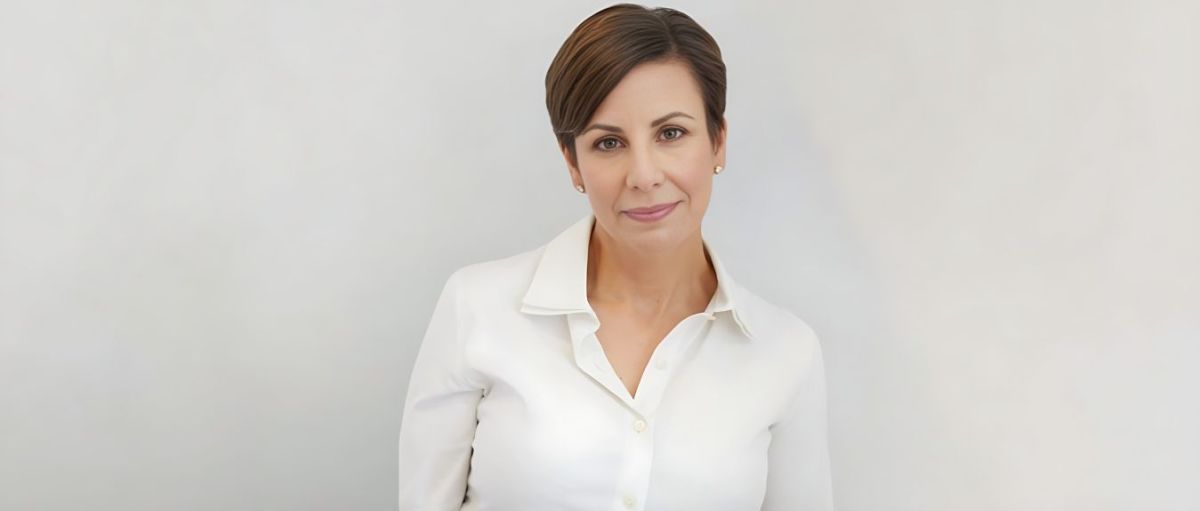
For Stephanie Gallo one primary objective seems clear: democratize the enjoyment of wine. Another is to make GALLO, as a company, into a “total alcohol beverage supplier.” This requires an “intrapreneurial mindset” within a very large family-owned firm, which has never lost contact with its strong roots and traditions in California.
The direct descendent of Ernest Gallo, Stephanie recently told her alma mater, Northwestern University, that additional “consumers in the United States and throughout the world” should be drinking wine. She added that the potential for expanding the overall market for wine remains substantial. “Only 33 percent of Americans drink wine on a regular basis, and of that 33 percent, 80 percent of the volume is done by 11 percent of the population,” she stated. “So I would argue that our quest to democratize wine still has not been met.” What some might view as dismal numbers regarding the wine market, Stephanie views as yet unconquered territory for expanding sales.
As Vice President of Marketing, Stephanie Gallo has tremendous influence in that regard. Gallo produces up to 3% of the world’s wine (that’s a lot). With over 7500 employees, the company accounts for an estimated 13%+ of total US wine industry revenue. As Richard Hemming MW noted several years ago, “It is often said that the world’s largest wine producer” only makes a very small percentage of “the total annual production of wine, which is illustrative of wine’s highly fragmented market structure.” It is within this market environment that Gallo has thrived, but never dominated the wine sector. “By comparison,” writes Hemming, “Coca-Cola owns about 50% of the global soft drinks market, while Anheuser-Busch has a 28% share of the global beer market.” Hemming believes this shows how “the industry [is] highly fragmented, with millions of smaller wine producers around the world each accounting for just a minuscule fraction of total global production.”
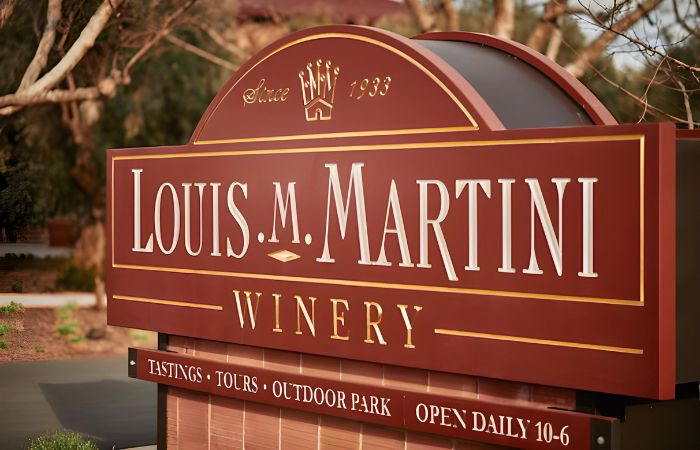
Source: Visit Napa Valley
Gallo may be working to change that, strategically, including recent acquisitions of some of those smaller wine producers (such as Massican) as well as collaboration with people like the famed “Rhone Ranger” winemaker Randall Graham. Writing for JancisRobinson.com, Elaine Chukan Brown concluded that such acquisitions and alliances provide Gallo with “irreplaceable outside perspectives.” This includes “creating multiple market-changing brands” and gaining “a wealth of experience with the technique, varieties, regions of California, risk-taking, and producing wines that can age.” Stepanie’s brother, Joe Gallo, told Elaine, “Great wines also need a unique vision.” Any perception of GALLO as simply a producer of unsophisticated, mass-market wines is misplaced.
In all, Gallo is an intriguing private company: a wine industry powerhouse, with products at all price points and significant investments in spirits, ready-to-drink products, and now, beer. In May 2024, Stephanie announced: “Today GALLO becomes a total alcohol beverage supplier as we announce our entrance into the beer category through a strategic partnership with Montucky Cold Snacks! This is in recognition that consumers are shopping across wine, beer, spirits and RTD categories.”
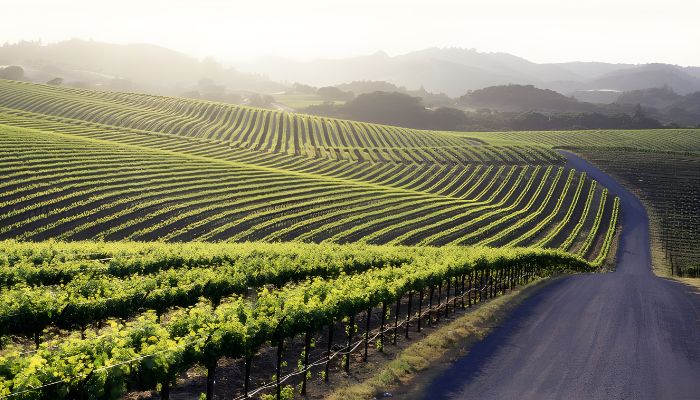
Source: GALLO
GALLO purchases vast quantities of fruit from grape growers in places like Lodi, California, but has longstanding interests in the fine and luxury wine segment, including in Sonoma and Napa. It transformed Louis Martini back into a premium brand after it had attained a commercial wine image two decades ago.
Stephanie kindly took time out of her incredibly busy schedule to answer some of editor Charlie Leary’s questions, by email. She graduated from the University of Notre Dame in 1994 and then earned an MBA in marketing from the Kellogg school at Northwestern. She has been the Vice President of Marketing at what is now named GALLO since 2008 and the Chief Marketing Officer since 2018.
Stephanie Gallo: Our mission at GALLO is to endeavor constantly to win new friends for wine as we drive sustainable growth across all total alcoholic beverage occasions. Each one of our strategic investments ladders back to this mission, which means that we have to make wine relevant and accessible to new consumers and evolving alcoholic beverage occasions.
Charlie Leary: This concise answer hits at least three key points: 1. Grow the number of wine drinkers, those “new friends”; 2. seek sustainable growth based on 3. defined but evolving “occasions” for consumption of any type of alcohol, hence the critical “total alcohol beverage” concept (with which sommeliers, in particular, should be very familiar). Thus the very astute final line, the critical import of which is, “make wine relevant” in this evolving consumption landscape.
Stephanie Gallo: GALLO made the business decision to sell both properties, as well as the related brands, Columbia Winery and Hogue Cellars, to Ackley Brands, a family-owned company based in Seattle. This will allow a Pacific Northwest wine group with a growing portfolio to move forward with building brand equity and customer relationships on a local, regionalized basis.
Charlie Leary: This answer is straight out of a Gallo press release. It points to the still very private nature of this private company’s business, but clearly Gallo is not giving up on the Pacific Northwest, with the references to a “growing portfolio” and “building brand equity.” Will this follow the model of small, quality winery acquisitions, such as Rombauer and Massican in California? Will Gallo help finally carve out a distinctive fine wine reputation for Washington State? The sale of two large, mid-priced brands seems significant as seemingly the “brand equity” component was lacking.
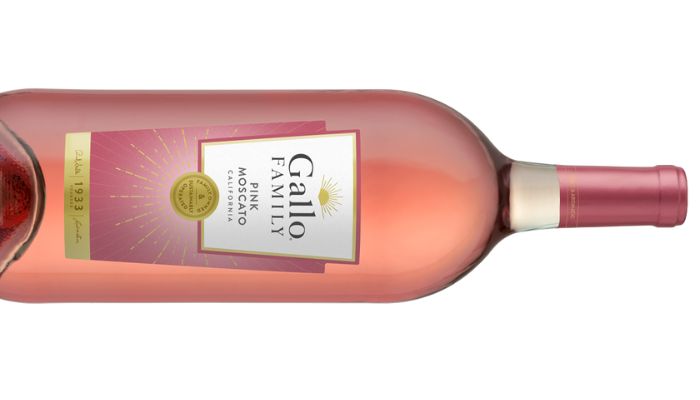
Source: GALLO
Stephanie Gallo: As our passion for wine continues to grow, so does our determination to innovate and evolve our increasingly diverse portfolio. GALLO began as a wine company, and we will continue to innovate and lead the wine industry. However, we see the lines blurring between traditional alcohol beverage categories – with consumers shopping across wine, spirits, beer, and RTDs. At GALLO, we are continually innovating from an intrapreneurial mindset, including growing our Spirits and RTD portfolios and establishing ourselves as a leader in these categories Our portfolio is diverse across the Total Alcohol Beverage landscape, and we believe that today holds more opportunities than ever before to serve joy to people in moments that matter to them.
Charlie Leary: This response is noteworthy. The “lines blurring between traditional alcohol beverage categories” does not cause concern for Gallo; the company strategically responds, “intrapreneurially.” Hence the emphasis on manufacturing and selling “across the Total Alcohol Beverage landscape.” According to employment ads, GALLO defines working with an “intrapreneurial spirit” as including “a knack for ownership, ready to set high expectations and drive initiatives forward with bold thinking and a willingness to learn from risks.” This will include diving “into data,” mining that data “for insights,” and leveraging them “to sculpt our commerce strategy.”
Stephanie Gallo expresses great optimism, in fact, regarding the existence of “more [business] opportunities than ever before” in this shifting landscape. There’s no fretting over Gen Z. And again, the emphasis on events, experiences, emotions, occasions, and memories appears in her statement regarding serving “joy to people in moments that matter to them.” This is clearly a Gallo marketing mindset that has relevance to the on-trade. Restaurants are about experiences and occasions involving alcohol of various types, prominently wine. Those kinds of occasions and experiences perhaps need to be translated into new sales contexts and opportunities addressing all sales channels.
Stephanie Gallo: [1] Winning new friends for wine, [2] connecting with the emerging consumer, [3] navigating overlapping social trends, [4] environmental impact and sustainability, as well as [5] evolving shopping habits, are all important challenges that the industry is facing and will continue to face over the next five years. GALLO is a multi-generational company that embraces a diversity of perspectives on the future of wine and spirits. There are many things we are doing as an industry to preserve and endure for the next several generations.
Charlie Leary: Wine has to be made to be people’s friend, someone they turn to and share special occasions with. This is a challenge, but the “making friends” metaphor works well as a solution. The emerging consumer is not limited to one generation, such as Millennials or Gen Z, but again this consumer is a challenge for wine in terms of “connecting,” which goes back to number 1. “Let’s be friends.”
“Navigation of social trends” is very unspecific, but the takeaways include that wine now confronts a myriad of social obstacles such as the abstention movement; there exists, however, a way around them. Number 4 refers to the wine industry’s environmental impact, which implicitly includes climate change. This inevitably enters into GALLO’s perspective, but specifics are lacking. In a separate interview, a GALLO official provided some missing details, stating that “across the GALLO organization, 85% of primary packaging will be 100% recyclable by 2030 to increase circularity and contribute to a Net Zero carbon economy.” GALLO is also “targeting an additional 10% reduction of total package weight (e.g., lowering raw material uses and reducing transportation related emissions).” Glass recycling also forms a major priority. GALLO has its own glass bottle factory.
Finally, people are shopping in new ways and wineries must be part of that mix. No one at GALLO is shying away from new sales methods. Overall, the choice of the top five obstacles is informative, but there’s practically no information about Gallo’s specific strategies regarding them.
The perspective is, however, long-term (“several generations”) and being supportive of “a diversity of perspectives” remains important to the wine industry’s (notably, not just GALLO’s) ability to “preserve and endure.” This may be a wakeup call for some traditional wineries.
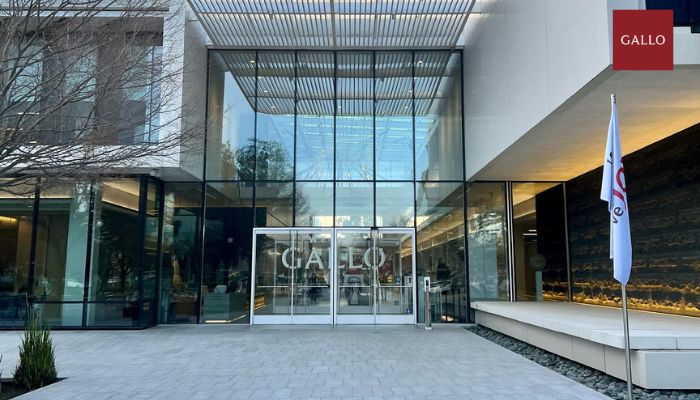
Stephanie Gallo: It all started with our founders, my grandfather Ernest and great uncle Julio Gallo, who, with limited resources and a lot of courage, set out to make wine a cornerstone of American culture. Over the years, Ernest and Julio grew a big family, and while their roots spread through California, their influence spread worldwide. As a company, GALLO has grown into more than just a winery. Today, we are a leader in both wine and spirits across the total alcohol landscape.
We wanted our diverse and collective identity to reflect exactly how far we’ve come over the past 90 years, as well as all that we aim to become. By refreshing our brand and positioning GALLO as a modern, unified, and innovative company, we believe that we will attract new consumers and partners who may not have considered us before.
Charlie Leary: The noteworthy phrases in this answer lie in the last sentence: The new GALLO is a “modern, unified, and innovative company” and must clearly communicate that message to the public. This is not the same E&J Gallo of 50 or even 10 years ago. Indeed, the new name, GALLO, makes no reference to wine. “Unified” suggests there is a single vision and a single voice as the outcome of a “diversity of perspectives” within the family firm. The name change forms part of a strategy to reach “new consumers” for sales as well as new “partners,” which seems to refer to an openness to business alliances. This appears to be a significant rebranding from GALLO’s perspective. That is, a rebranding to expand the market with no shyness about reimagining partnerships in a “total alcoholic beverage landscape” within which “democratizing” wine consumption must remain an important goal if sales growth is to trend upward. The GALLO perspective is global. “Democratizing” as a marketing goal is not new. In 2016, Stephanie Gallo said “We see premiumization happening as a category leader,” but added, “I also think we also need to focus on what are we doing as an industry to help continue to democratize wine. How do we bring new consumers into the wine category, and most importantly, how can we continue to expand category occasions?”
As the Press Democrat noted in 2016: “Gallo has had success with its sweet Moscato category, which is looked down on by wine critics, though it brought in new first-time drinkers. It used that success to launch its sweets line, a slightly fizzy wine in peach, pineapple, and berry flavors, which again exceeded Gallo’s sales expectations. In fact, 22 percent of the volume of the brand was from those who had never drunk wine before.” Thus Stephanie Gallo stated: “I think that is excellent news for the wine category.” The vital question then as now was: “How do we begin to create products that appeal to consumers who are interested in our category but may be intimidated to buy it?”
[[relatedPurchasesItems-55]]
This is not all new, as Ernest and Julio Gallo clearly pursued making “wine a cornerstone of American culture”; continuity and tradition remain important, but not at the cost of remaining rigidly tied to an outdated business model or confining GALLO to solely wine production and marketing. A significant investment in marketing is important, a lesson that many wine industry participants still must learn. GALLO is reinventing itself, Stephanie Gallo appears to say, and the way to continued growth is by reaching those “who may not have considered us before.”
Header Image: Stephanie Gallo; source; LinkedIn
Grow your wines in the off-premise channels of the USA. The Early Bird submission deadline is February 20, 2026, and the domestic submission deadline is June 30, 2026. Here is how to enter.